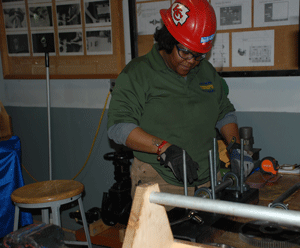July 31, 2012
By Joe Maniscalco
Over 50 percent of those enrolled in the NY District Council of Carpenters Labor Technical College are people of color. But only about 15 percent of the total group are women. That’s a heck of a lot better than how it used to be for women when College Director Elly Spicer was coming up through the program more than 25 years ago. Still, she’d like to see the disparity dissolve much quicker.
“I’m impatient,” Spicer said this week. “I would like to see it flip over faster. But it would be absolutely incorrect to say that there hasn’t been change. There has been significant change.”
Back in 1985, when Spicer first decided that becoming a union carpenter was the smartest career move she could ever make, it was rare to see another female face training at the Labor Technical College.
 “If I saw another woman the whole night that I was in school, that was a lot,” Spicer said. “I never worked on a job with another women in my trade. I worked with a woman electrician, a woman sheet-metal worker and once a blue moon a woman plumber. But that’s was it.”
“If I saw another woman the whole night that I was in school, that was a lot,” Spicer said. “I never worked on a job with another women in my trade. I worked with a woman electrician, a woman sheet-metal worker and once a blue moon a woman plumber. But that’s was it.”
Today, however, Spicer said that it’s impossible to go through the Labor Technical College’s apprentice program in an all-male class – and that having three or four tradeswomen on at the same job site is not uncommon.
“When I worked in the field I had people come to me and say, ‘Gee, I never saw a woman who did this before,’ Spicer recalled. “They don’t say that anymore.”
Young Brooklynite Shawan Holder just recently completed her apprentice training at the Labor Technical College. While she’s faced many challenges working in the field, Holder said she isn’t going to let that stop her from her achieving her goal of being the best.
“The ratio of men to women is a big difference,” she said. “But I can’t say that I’m being treated unfairly out there. I do enjoy what I do, so I want to learn more and do more. There are obstacles, but it’s worth it.”
 According to Spicer, the biggest problem facing women striving to carve out a career in the male-dominated field of carpentry isn’t getting a job – it’s keeping it.
According to Spicer, the biggest problem facing women striving to carve out a career in the male-dominated field of carpentry isn’t getting a job – it’s keeping it.
“Out in the field when they become journey level, the retention issues are greater with both people of color and women,” Spicer said. “Why? Beats me. Maybe they decided they want to do something else? Maybe, the economy is very bad. We’ve lost a fair amount of membership because they’ve had to feed their families and the work wasn’t out there.”
If a female carpenter perseveres for seven to eight years, Spicer said that’s a pretty good indication that those women are “invested” and are firmly committed to establishing a career for themselves. However, it’s a very precarious time for women in the trades prior to that, she said.
“Up until that point, they can easily go away and decide to do something else,” Spicer said. “After three or four years some may decide, this isn’t for me. Or, I’m not getting enough work. Or, I’m tired of the isolation on the job of being the one woman out of 50 to 60 guys.”
Apprentice program graduates either gain employment through the union’s out-of-work dispatch system, or by being part of company crews that move from job to job. Spicer said that in order for more women to develop long-term careers in the industry, they must gain greater access to these company crews. Presently, that is not happening enough.
“We need to see more women transition into the permanent crews of companies, and then that shift will be made,” Spicer said. “We’re seeing some of that, but it’s a slow transition. When I was coming through, it almost never happened.”
The NY District Council of Carpenters Labor Technical College holds open admissions to its apprentice program about once every two years. When they do, hundreds show up for a spot, but only a fraction are accepted. The program is overseen by the NY Department of Labor. Information about new classes can be found at http://www.nycdistrictcouncil.com.
Spicer, who couldn’t identify a two-by-four before applying to the Labor Technical College’s apprentice program almost 30 years ago, still encourages more women like her to apply despite the many difficulties.
“The possibilities are there,” she said. “You can be very successful. You can raise a family. You have incredible benefits. And, you can walk in not knowing how to do it – and be taught how to do it while you’re getting paid. It doesn’t get any better than that.”



